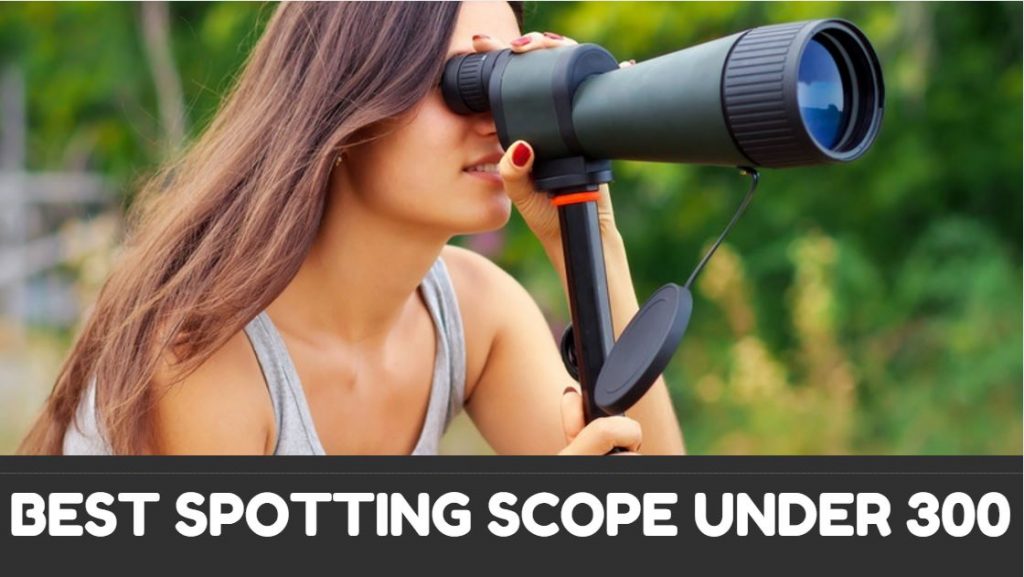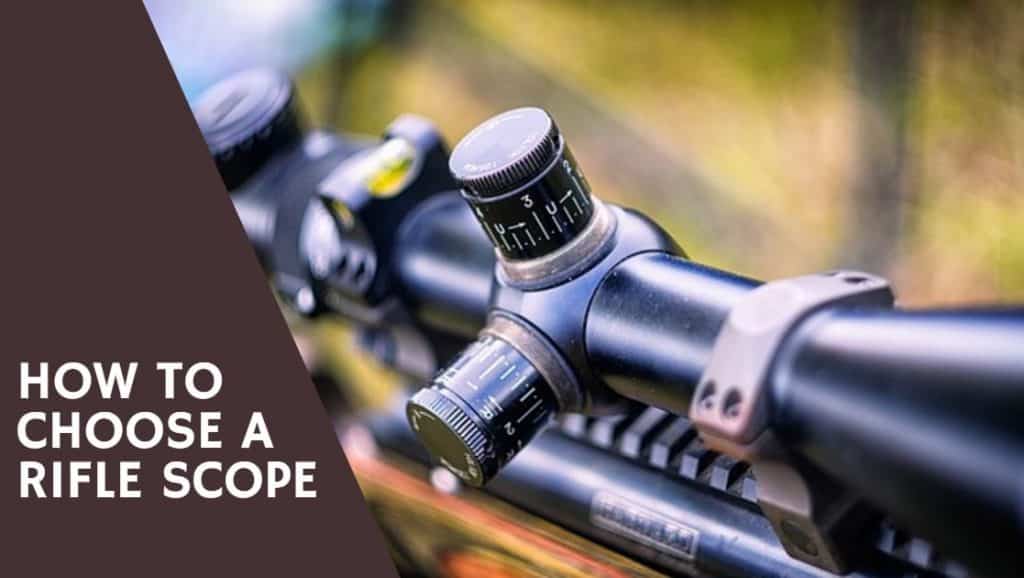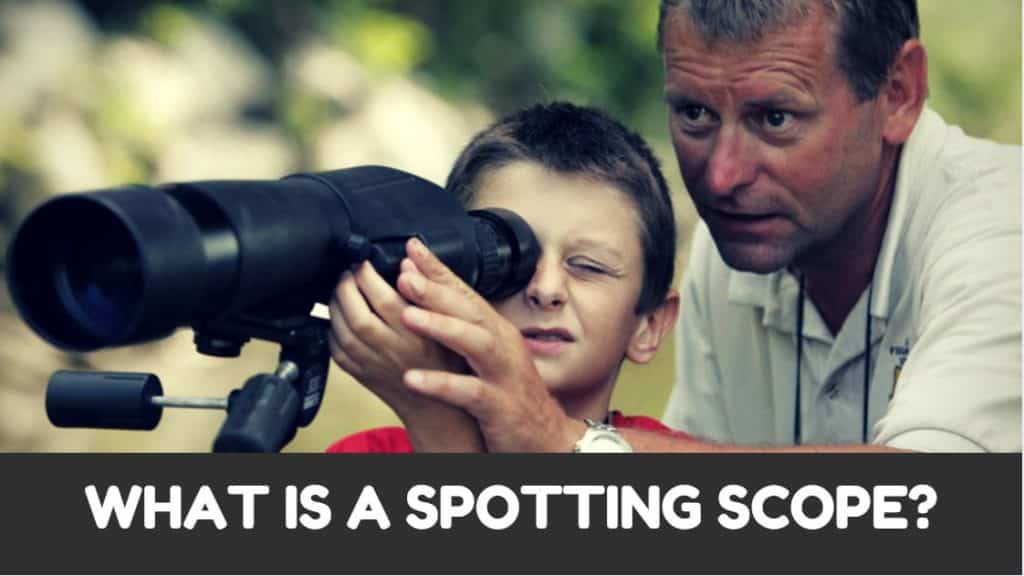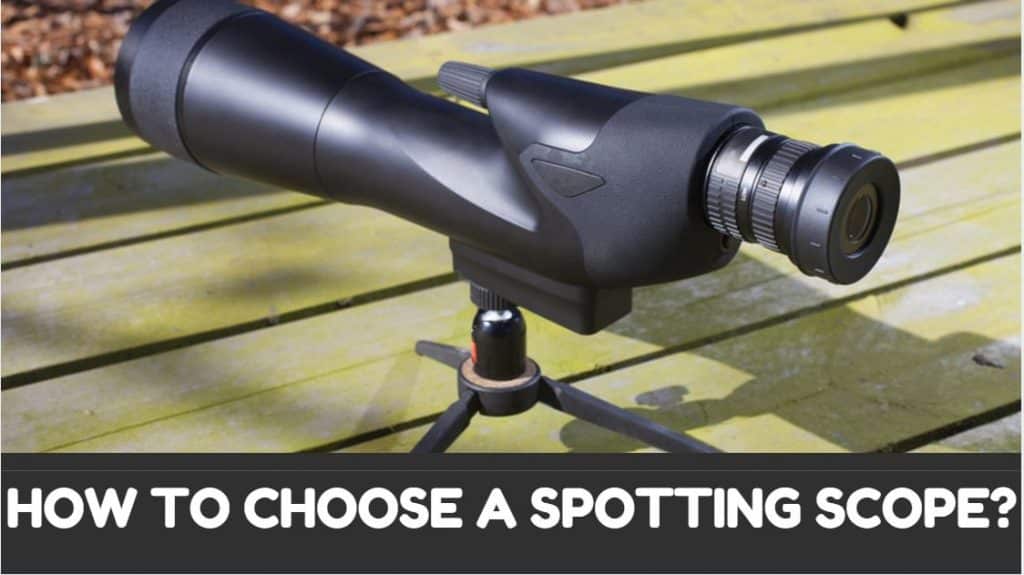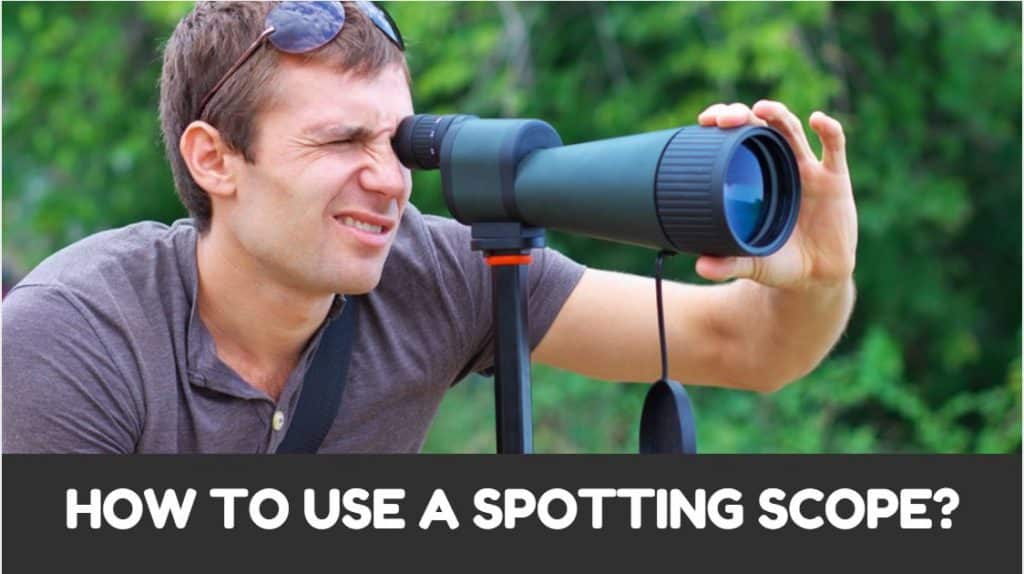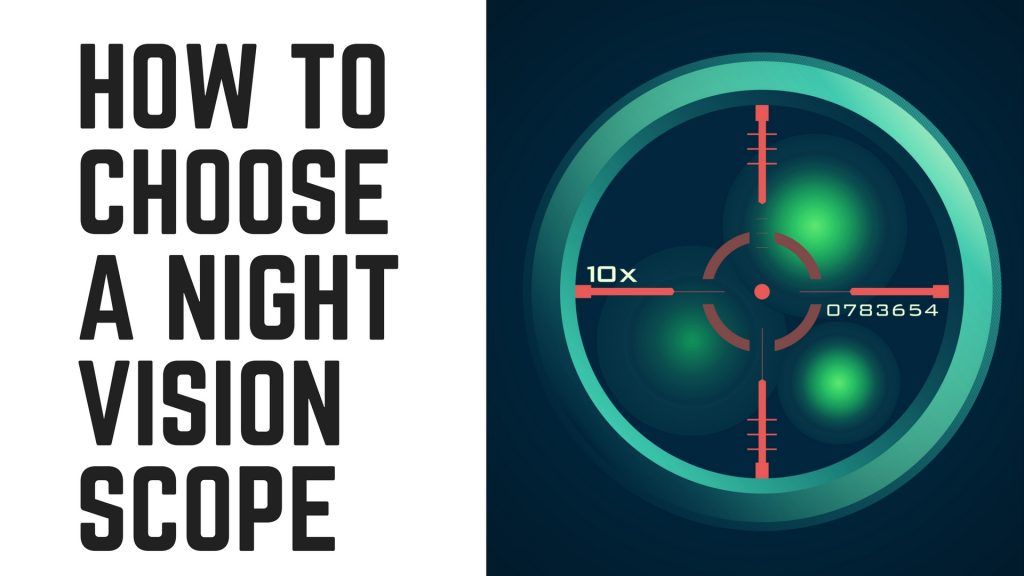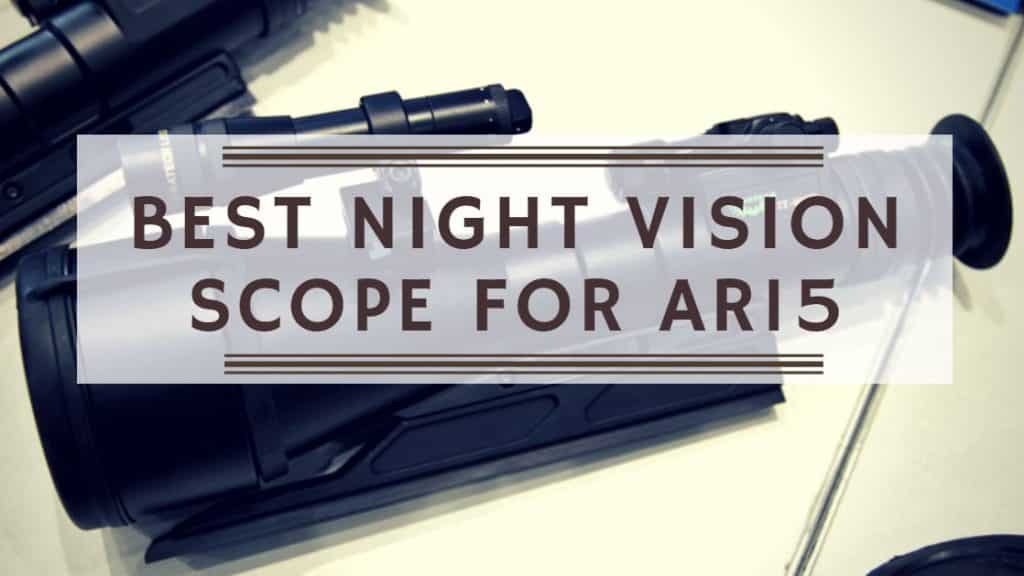Welcome to our reviews of the Best Spotting Scopes Under 300.
We have reviewed some of the top-rated spotting scopes to help you find the Best Spotting Scope Under 300.
If you are in a hurry:
- ULTIMA ANGLED ZOOM SPOTTING SCOPE: This versatile all-around...
- INCLUDES ESSENTIALS FOR BETTER VIEWING: The Celestron Ultima...
- MULTI-COATED OPTICS: Every lens surface is coated multiple...
Last update on 2026-02-19 / Paid links / Images from Amazon Product Advertising API
Now, let us move to our in-depth reviews.
Best Spotting Scopes Under 300 Reviews
Here is our list of the 5 Best Spotting Scopes Under 300:
Last update on 2026-02-19 / Paid links / Images from Amazon Product Advertising API
Let us now look at each of these spotting scopes in detail.
Celestron 22-66x100mm

One feature which stands out in Celestron 22-66x100mm is the 100mm lens which is one of the largest in this category. This means that it gathers more light and your picture is clearer even at greater distances. You will appreciate this feature if you are a birder and want the highest quality image of your subject with the most detail in vivid color.
This is especially useful if you have a cell phone or DSLR camera attached to the scope to capture your images. You can get photographic quality images for printing or slideshows if you buy a separate T-ring adapter for the scope.
Another feature on the Celestron that goes well with the large lens is the multi-coating on the lenses. The multi-coating on the lens improves the transmission of light into the spotting scope. When your image comes into the view, the coating on the lens gathers all the light and uses it to brighten up the picture without glare or trailing.
You will appreciate this feature if you decide to use the scope in lower light conditions because you will still get a bright clear picture.
Pros
- Large 100mm objective lens gathers more light for clearer pictures
- Multi-coated optics improve the transmission of light into the lens
- Long magnification range of 22x-66x for long distance viewing
- Wide field of view allows you to keep track of more than one subject at a time
- Adapter available for a digital camera so you can take great pictures
Cons
- Eye relief is a bit shallow at 18mm
Bushnell 20-60x65mm

The Bushnell 20-60x65mm comes with a rugged exterior designed for use in extreme weather conditions. This is a great feature if you are a hunter who takes the scope on long hunting trips, and doesn’t wish to worry about equipment breaking midway through.
The case is “rubber-armored”, 100 % waterproof and creates a strong seal to keep out all moisture. Bushnell 20-60x65mm also comes with a hard case to keep the scope safe from dropping or banging around while moving locations.
Another great feature of this scope is the multi-coated optical system giving HD quality pictures. The extensive weatherproofing usually means a sacrifice in other areas. So, the objective lens at 65mm is not as large as some of the other scopes in this category but the quality of the rest of the optics more than makes up for it.
This scope has a magnification that you can adjust from 20x to 60x which doesn’t get distorted due to shortcomings in the rest of the optical system. You will really appreciate the way the optics work when you are trying to get a clear shot of your target at the highest magnification.
Pros
- Rubber armored exterior means the scope will hold up to the most rugged conditions
- 100% waterproof and fog proof with heavy-duty sealing around the lens
- 20x-60x magnification allows you to focus in on targets at a great distance
- Multi-coated optics means greater light transmission for higher quality picture
- “Bulletproof Guarantee” covers 100% of the cost of the scope if anything goes wrong with it
Cons
- Images may become a bit blurry at higher magnification
Redfield Rampage 20-60x80mm

Redfield stands out due to the light gathering capabilities of its optical system. The lens is fully multi-coated which means that it is very effective at transmitting light into your image even when there is less light. The “twilight factor” of the Redfield is 40 at 20x magnification and 69 at 60x magnification.
This is calculated by multiplying the objective lens size with the magnification and finding the square root of that number. In a nutshell, larger your lens and greater your magnification, the higher is “twilight factor”. What this means for you is that you don’t have to cut your trip short because the sun is going down. You will get a spectacular view of the stars and planets when you aim it at the night sky.
Redfield Rampage has a polycarbonate casing that keeps the unit sealed and protects it from natural elements. The lens chamber is also fog-proof so you don’t need to worry about even extreme humidity affecting your ability to see the target. You will love this feature when you find yourself in the middle of a rain shower and you have focused on the perfect shot.
Pros
- Polycarbonate casing provides shock resistance and weatherproofing
- 20x–60x magnification lets you get closer to your target without scaring it off
- Generous eye relief so you don’t need to press your face into the eyepiece
- A large field of view gives you a greater view of your subject and surroundings
- 80mm objective lens provides a crisper picture at higher magnifications
Cons
- Some users have reported that images are not clear at higher magnifications
Meade Instruments 20-60x100mm

Meade 20-60x100mm is our choice as a runner-up to the title of the Best Spotting Scope Under 300.
I highly praise the Meade20-60x100mm for its 100mm objective lens that allows you to get clear pictures at greater distances even at 60x zoom.
Similarly, thanks to its light gathering capabilities, you will get bright and colorful pictures even in low light. You would love this feature when using the scope to hunt animals during dawn or dusk hours or when the weather is not cooperative.
As the lens on this unit is large, it’s a bit heavy to carry so make sure you have a comfortable carrying case. A strong tripod wouldn’t be a bad idea either.
The wheels that used for focus and zoom work smoothly when you are trying to zero in on your subject. This is very useful for hunting live game that might move at any moment, so time is of the essence. You can focus and zoom quickly and accurately before taking your shot without having to fumble around.
Pros
- The large 100mm objective lens gives you clear images even at high magnifications
- 20x– 60x zoom allows you to get a closer view of the game from greater distances
- The case is shock resistant so it doesn’t get damaged by rugged terrain
- Weatherproof casing means that moisture will not get into the lens and distort the image
- Camera adapter comes with this unit so you can take high-quality pictures of your view
Cons
- The scope is large and heavy due to the size of the lens
Vanguard Endeavour 15-45x60mm
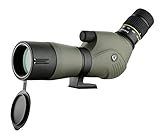
The Vanguard is a scope designed for rugged outdoor use with a heavy-duty rubber-armored body made with magnesium. The seal on this scope is so durable that it isn’t only waterproof, it is waterproof submersible. So if you often carry your scope near water bodies, then this is a great feature.
I recommend this spotting scope for those users who would be using it in the most extreme weather conditions as well as rough terrain. If you know that you will be hiking along rocky paths or wading through streams to get to your perfect spot, then Vanguard is the perfect fit for you.
Another great feature of this scope is the extra protection to prevent the weather from affecting your shots or ruining your scope. The built-in sun shield eliminates the glare caused by sunlight which can ruin a shot by creating a haze around the image. This scope also comes with a padded sling that acts as a raincoat for protection in inclement weather. You will appreciate all this extra protection if you experience some extreme weather conditions while out on the trail.
Pros
- Comes with a digiscoping adapter to take great pictures with your digital camera
- Heavy duty weatherproofing casing prevents moisture from getting into the scope
- Additional weather safety features like sun shield and raincoat
- Easy to use focus wheel for instant adjustments while you have a target in view
- “V-Max” Coating on the lenses gives greater light transmission for clearer images
Cons
- Slightly low magnification range of 15-45x
How to Buy a Spotting Scope for Under $300
As I said earlier, you can find a suitable spotting scope without spending a lot of money. But, the trick is to know the kind of spotting scope which meets your need. When you are shopping around for a spotting scope in a reasonable price range, you should ask yourself these questions:
- What are you going to use it for?
- Where would you be using it?
- What features are important to you?
What are you going to use it for?
If you are taking your scope out for hunting, then your needs are different than if you were trying to get some cool nature shots to hang up on your wall. For both activities, the ability to see at great distances is important. But, cool nature shots need a scope that can produce a clear, vivid image with great detail and color.
And, if you are a hunter then focus and eye relief on the scope are more important. Birders may want to be able to see all the details of that rare bird and capture that image on their cell phones. So knowing what you want to use the scope for and what that requires is a very important first step.
Where would you be using it?
Some scopes in this price range allow for more rugged usage than others. If you are likely to encounter extreme weather during your trip, then you should look for a spotting scope with weatherproofing.
If you plan to use your scope in windy conditions, then go for one with a 45-degree angle and a solid tripod. In such windy areas, control is the key to getting a great shot.
But if you would be using the scope in moderate conditions on a regular basis, then sacrifice weatherproofing and go for better optics. A good optical system comes with a high-quality lens and light-gathering capabilities to provide great images even in low light.
What features are important to you?
I hope by now you have been able to figure out what you are going to use your spotting scope for and where you would be using it.
So, let’s move on to the features that will help you get the most out of your spotting scope. Some most important features of a spotting scope are:
- Magnification
- Lens Size
- Lens Coating
- Weatherproofing
- Eye Relief
- Viewing Angle
Magnification
Spotting scopes in this category will usually have magnification ranges up to 60x zoom. You should be aware that lighting and weather impact the effective range. When viewing long distances, you may not be able to use full magnification if the weather is not ideal.
Lens Size
If you are looking for a reasonably priced spotting scope with the best image quality, then you should go for the largest lens size you can afford.
Large lenses vary between 60 and 100mm and have amazing light-gathering capabilities. This means that the images are sharper and brighter even in low-light conditions. The size of the lens does increase weight, so if you have to carry your spotting scope for long distances then get a comfortable carrying case.
Lens Coating
All scopes in this category come with some type of coating on the lens to improve the transmission of light. Scopes that come with a fully multi-coated lens are best for light gathering. Such spotting scopes give you bright and clear images when less light is available.
Weatherproofing
Most spotting scopes under 300 come with some sort of weatherproofing to protect the lens from moisture. But, how much weatherproofing you need would depend on the weather conditions in your area.
Eye Relief
Eye relief on a spotting scope is the most distance your brow can be away from the lens when you are trying to focus on your subject.
A shallow eye relief means that you need to press your eye right up against the lens to be able to see. While generous eye relief will allow you to focus comfortably without having to adjust. Eye relief is more important for hunting as speed can sometimes be a big factor in focusing and generous eye relief can make that much easier to do.
Viewing Angle
Scopes come in two different types of viewing angles, straight and angled.
An angled scope is easier to use when you are aiming at something in the sky like a bird or the stars. Angled scopes are preferable for groups who wish to share the scope. Once the spotting scope is mounted on a tripod, you don’t need to move it around much for people of varying heights to take a look.
Straight scopes need the user to look straight ahead at their target. These are preferable for hunters who want to be able to zero in on the subject quickly from different points like the ground or a vehicle.
Conclusion
Spotting scopes are a great way to get the most out of your birding or hunting experience. But, there is no reason to spend big bucks on a premium spotting scope. Even the decently priced ones will give you the performance you need for most trips.
We promised you at the start of this article that we will help you find the Best Spotting Scope Under 300. In our pursuit, we reviewed 5 of the most popular spotting scopes from different brands.
Here is our list of 5 Best Spotting Scopes Under $300:
- Celestron 22-66×100 — Winner
- Bushnell 20-60×65 — Runner Up
- Redfield 20-60×80
- Meade 20-60×100
- Vanguard Endeavour 15-45×60
Celestron 22-66×100 comes with the same viewing quality as the premium quality Celestron spotting scopes but at a great price. The magnification goes up to 66x, which for a unit with lesser quality optics would have been blurry at best.
The superior system of the Celestron gives you great images even at long distances. This scope is perfect for most applications from bird watching to hunting as it fulfills the needs for long-range viewing with crisp and clear images at all magnifications.
We hope you like our pick of the Best Spotting Scopes Under 300. But. if you think there is another scope that deserves to be on our list, then please let us know via comments. We will try to include it in our next review.
P.S. If you are looking for more budget options, then read our Best Spotting Scope Under 100 guide to help you pick one.
Last Updated on June 14, 2025 by Victor Mays
